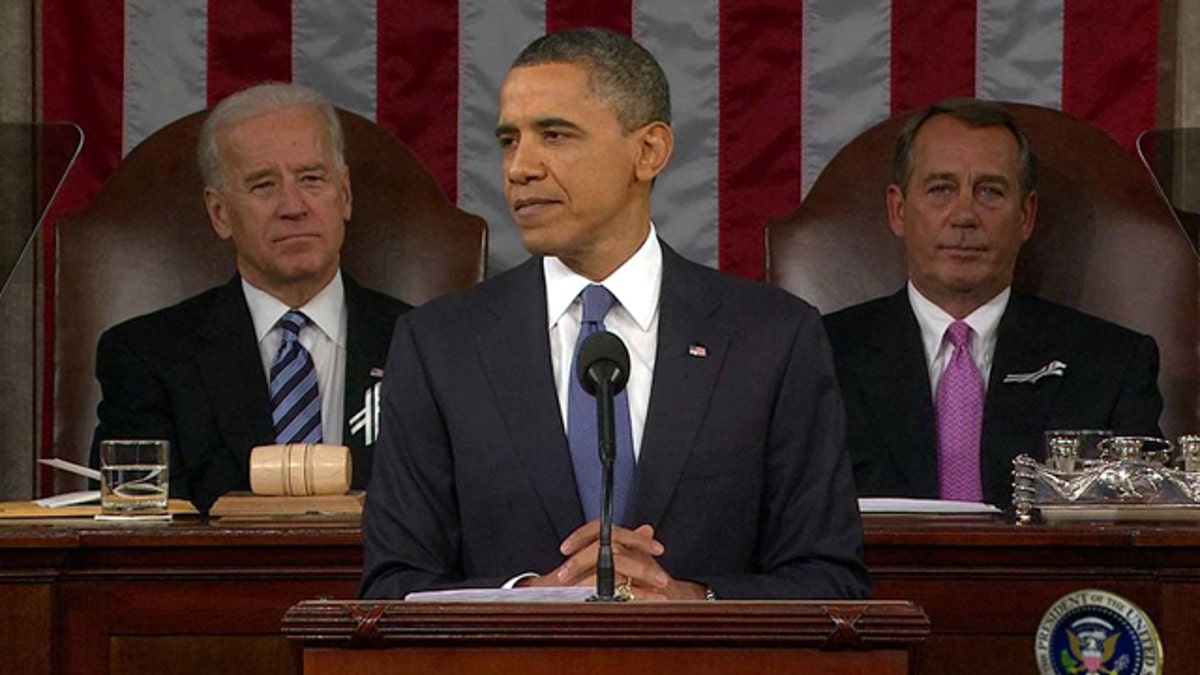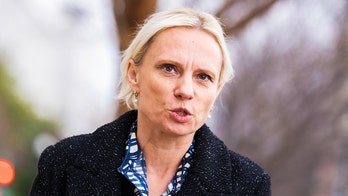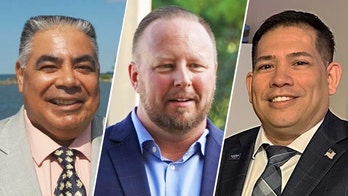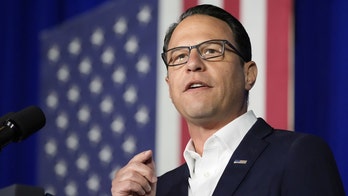
Jan. 25: President Obama addresses Congress during his State of the Union Address as Vice President Joe Biden and House Speaker John Boehner listen. (AP)
Focusing on America as a nation of big ideas, President Obama told Congress on Tuesday night that he wants to reorganize the federal government to make it serve a more competitive nation while also simplifying the tax code, doubling exports in three years and investing in free enterprise that drives innovation.
In a State of the Union speech that clearly aimed at tacking toward the middle but may just have aggravated tensions, the president offered some suggestions that would be natural winners for his political opponents -- reducing federal spending, abolishing cumbersome regulations, cutting the deficit and even changing his signature health care law.
He also proposed favorites for members of his Democratic Party -- increases in infrastructure investments, expanded education programs, government support for clean energy initiatives -- paid for in part by cutting off tax breaks for oil companies -- and pledges to maintain Social Security benefits.
In the pall of a chamber sombered by the shooting of Rep. Gabrielle Giffords and 18 others in Tucson less than three weeks ago, Obama infused his remarks with bipartisan tones and highlighted some of America's past achievements as examples of how to maintain the country's predominance in the world.
Most of all, he urged a country drowning in debt to think big.
"We do big things," the president said in a speech whose top half focused on harnessing the creativity and imagination of Americans as a means to emerge from a deep and lasting recession.
"We are the nation that put cars in driveways and computers in offices; the nation of Edison and the Wright brothers; of Google and Facebook," he said.
But in a speech that tried to lunge toward bipartisanship and brokered themes of "shared responsibility," the president's remarks were sure to divide lawmakers. To support innovation needed to develop the next "Apollo Projects," Obama said he wants to cut tax credits for oil companies.
"We need to get behind this innovation. And to help pay for it, I'm asking Congress to eliminate the billions in taxpayer dollars we currently give to oil companies. I don't know if you've noticed, but they're doing just fine on their own. So instead of subsidizing yesterday's energy, let's invest in tomorrow's," Obama said.
The president also took on deficit reduction, in part, by insisting that the recent tax deal he cut with Republicans is only temporary.
"If we truly care about our deficit, we simply cannot afford a permanent extension of the tax cuts for the wealthiest 2 percent of Americans. Before we take money away from our schools, or scholarships away from our students, we should ask millionaires to give up their tax break," he said.
Offered up as the president lays the early ground for a 2012 re-election bid, Obama's State of the Union address appealed to common threads on unity. The president said that regardless of Americans' differences, everyone in the room could agree the nation offers the most opportunities and freedoms.
"As contentious and frustrating and messy as our democracy can sometimes be, I know there isn't a person here who would trade places with any other nation on Earth," Obama said.
Saying he wants to set the country on another step toward greatness, Obama argued the future is America's to win as long as it doesn't sit still.
"This is our Sputnik moment," he said, referring to the space race of 50 years ago.
But in order to reach those goals, the president proposed ideas that may not be big enough. Obama recognized the deep financial crunch the nation is in as it struggles to emerge from a recession that opponents say was exacerbated by Obama administration policies.
But he also acknowledged that debt reduction will be difficult, not least because he doesn't agree with many of his own deficit commission's recommendations.
Debt and spending are front and center for the Republican-majority House, which earlier in the day passed a resolution to cut the budget to 2008 levels. Providing the Republican rebuttal was Budget Committee Chairman Paul Ryan of Wisconsin, who said the debt is unsustainable.
"A few years ago, reducing spending was important. Today, it's imperative. Here's why. We face a crushing burden of debt. The debt will soon eclipse our entire economy, and grow to catastrophic levels in the years ahead," Ryan said. "We cannot deny it; instead we must, as Americans, confront it responsibly."
And while members of both parties integrated in the House chamber for the speech, many disagreed from the start on what needs to be done.
"Tonight, President Obama once again tried to persuade the American people that government should be the mechanism for job creation and that economic recovery is dependent on more government spending. Evidently the president still believes that you can maintain record-high spending levels and pay down the debt at the same time, which defies logic,” said Rep. John Culberson, R-Texas.
The president did propose freezing domestic discretionary spending for five years, noted he's already held salaries still for federal workers for two years and credited Secretary of Defense Robert Gates for suggesting tens of billions in cuts in the military budget.
The president added he would be willing to look at medical malpractice reforms and wants to slow the rising costs of Medicare and Medicaid, "which are the single biggest contributor to our long-term deficit."
Obama suggested simplifying the tax code to get rid of loopholes for special interests, and said he's willing to listen to other proposals to reduce the debt..
"I'm willing to eliminate whatever we can honestly afford to do without. But let's make sure that we're not doing it on the backs of our most vulnerable citizens. And let's make sure what we're cutting is really excess weight. Cutting the deficit by gutting our investments in innovation and education is like lightening an overloaded airplane by removing its engine. It may feel like you're flying high at first, but it won't take long before you'll feel the impact," he said.
On health care, the president noted that the 1099 requirement that forces businesses to report purchases over $600 is ready for the boot, but insisted that he is unwilling to accept changes to the new law that would permit insurance companies to deny someone coverage because of a pre-existing condition or increase the cost of prescription drugs for seniors.
"Now, I've heard rumors that a few of you have some concerns about the new health care law. So let me be the first to say that anything can be improved. If you have ideas about how to improve this law by making care better or more affordable, I am eager to work with you," Obama said.
The speech, which spent about 85 percent of the time on economic issues, also gave fodder to peripheral debates.
The president appealed to lawmakers to let children of illegal immigrants stay in the United States.
"Today, there are hundreds of thousands of students excelling in our schools who are not American citizens. Some are the children of undocumented workers, who had nothing to do with the actions of their parents. They grew up as Americans and pledge allegiance to our flag, and yet live every day with the threat of deportation. Others come here from abroad to study in our colleges and universities. But as soon as they obtain advanced degrees, we send them back home to compete against us. It makes no sense," he said,
"I am prepared to work with Republicans and Democrats to protect our borders, enforce our laws and address the millions of undocumented workers who are now living in the shadows. I know that debate will be difficult and take time. But tonight, let's agree to make that effort. And let's stop expelling talented, responsible young people who can staff our research labs, start new businesses, and further enrich this nation," the president continued.
He thanked the men and women in the Armed Forces for their service in Iraq and Afghanistan and credited law enforcement and intelligence communities with keeping America safe. He hailed efforts at freedom in Tunisia and southern Sudan and passingly referred to Iran's nuclear program. He coupled his remarks on successes in Afghanistan by recognizing the end of the military's don't ask, don't tell policy and urging all college campuses to open their doors to military recruiters and ROTC.




